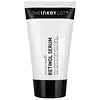What's inside
What's inside
 Key Ingredients
Key Ingredients

 Benefits
Benefits

 Concerns
Concerns

 Ingredients Side-by-side
Ingredients Side-by-side

Water
Skin ConditioningGlycerin
HumectantButylene Glycol
HumectantPropanediol
SolventDicaprylyl Carbonate
EmollientTocopherol
AntioxidantHydroxyethyl Acrylate/Sodium Acryloyldimethyl Taurate Copolymer
Emulsion StabilisingSqualane
EmollientPolysorbate 60
EmulsifyingSorbitan Isostearate
EmulsifyingPhenoxyethanol
PreservativeCaprylyl Glycol
EmollientPhospholipids
Skin ConditioningGlycine Soja Oil
EmollientGlycolipids
Skin ConditioningGlycine Soja Sterols
EmollientRetinyl Acetate
Skin ConditioningDimethicone
EmollientLeuconostoc/Radish Root Ferment Filtrate
AntimicrobialHyaluronic Acid
HumectantDimethyl Isosorbide
SolventHydroxypinacolone Retinoate
Skin ConditioningCarbomer
Emulsion StabilisingPolysorbate 20
EmulsifyingPalmitoyl Tripeptide-1
Skin ConditioningPalmitoyl Tetrapeptide-7
Skin ConditioningSodium Lactate
BufferingTocopheryl Acetate
AntioxidantTetrasodium Glutamate Diacetate
Sodium Hydroxide
BufferingTetrahexyldecyl Ascorbate
AntioxidantWater, Glycerin, Butylene Glycol, Propanediol, Dicaprylyl Carbonate, Tocopherol, Hydroxyethyl Acrylate/Sodium Acryloyldimethyl Taurate Copolymer, Squalane, Polysorbate 60, Sorbitan Isostearate, Phenoxyethanol, Caprylyl Glycol, Phospholipids, Glycine Soja Oil, Glycolipids, Glycine Soja Sterols, Retinyl Acetate, Dimethicone, Leuconostoc/Radish Root Ferment Filtrate, Hyaluronic Acid, Dimethyl Isosorbide, Hydroxypinacolone Retinoate, Carbomer, Polysorbate 20, Palmitoyl Tripeptide-1, Palmitoyl Tetrapeptide-7, Sodium Lactate, Tocopheryl Acetate, Tetrasodium Glutamate Diacetate, Sodium Hydroxide, Tetrahexyldecyl Ascorbate
Ingredients Explained
These ingredients are found in both products.
Ingredients higher up in an ingredient list are typically present in a larger amount.
Polysorbate 20 is made by combining ethoxylation of sorbitan, ethylene oxide, and lauric acid. It is a mild cleansing agent, surfactant, and emulsifier.
As a surfactant, it helps collect dirt and oils for washing. Emulsifiers prevent oils and water from separating.
Polysorbate 20 also adds scent to a product. Since it is made using sorbitol, it has a sweet scent. Sorbitol can also be found in fruits such as apples and peaches.
The lauric acid used to create Polysorbate 20 is often derived from coconuts.
Polysorbate 20 may not be fungal acne safe.
Learn more about Polysorbate 20Propanediol is an all-star ingredient. It softens, hydrates, and smooths the skin.
It’s often used to:
Propanediol is not likely to cause sensitivity and considered safe to use. It is derived from corn or petroleum with a clear color and no scent.
Learn more about PropanediolTocopherol (also known as Vitamin E) is a common antioxidant used to help protect the skin from free-radicals and strengthen the skin barrier. It's also fat soluble - this means our skin is great at absorbing it.
Vitamin E also helps keep your natural skin lipids healthy. Your lipid skin barrier naturally consists of lipids, ceramides, and fatty acids. Vitamin E offers extra protection for your skin’s lipid barrier, keeping your skin healthy and nourished.
Another benefit is a bit of UV protection. Vitamin E helps reduce the damage caused by UVB rays. (It should not replace your sunscreen). Combining it with Vitamin C can decrease sunburned cells and hyperpigmentation after UV exposure.
You might have noticed Vitamin E + C often paired together. This is because it is great at stabilizing Vitamin C. Using the two together helps increase the effectiveness of both ingredients.
There are often claims that Vitamin E can reduce/prevent scarring, but these claims haven't been confirmed by scientific research.
Learn more about TocopherolWater. It's the most common cosmetic ingredient of all. You'll usually see it at the top of ingredient lists, meaning that it makes up the largest part of the product.
So why is it so popular? Water most often acts as a solvent - this means that it helps dissolve other ingredients into the formulation.
You'll also recognize water as that liquid we all need to stay alive. If you see this, drink a glass of water. Stay hydrated!
Learn more about Water